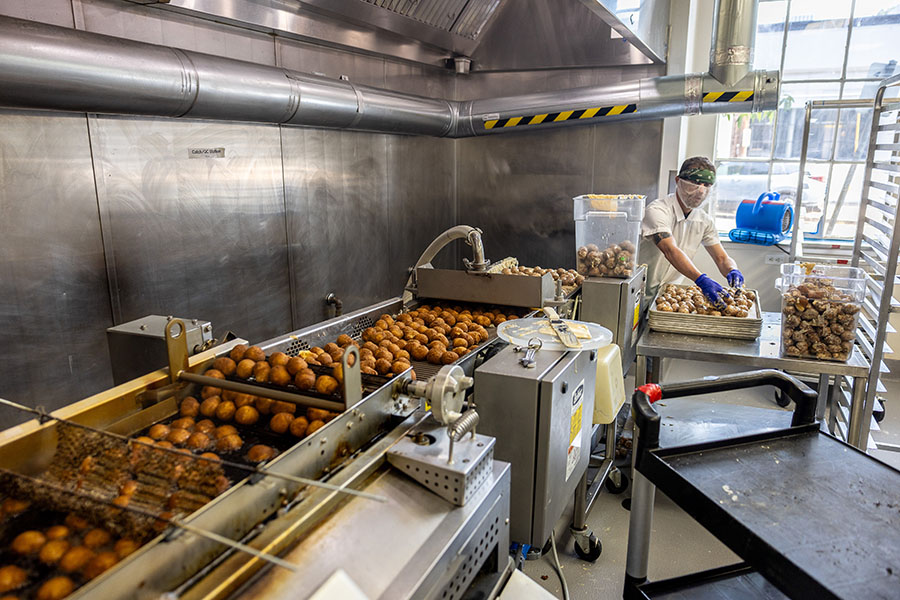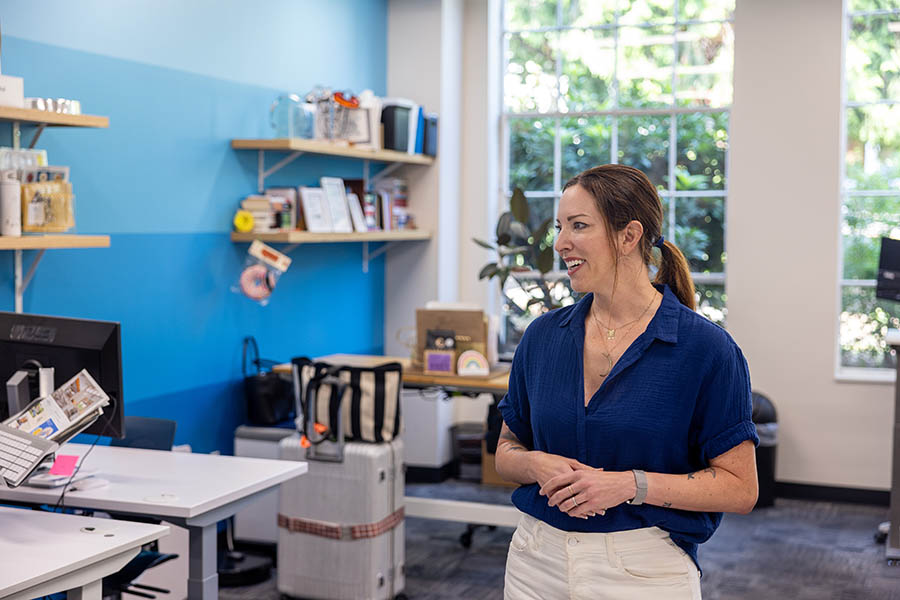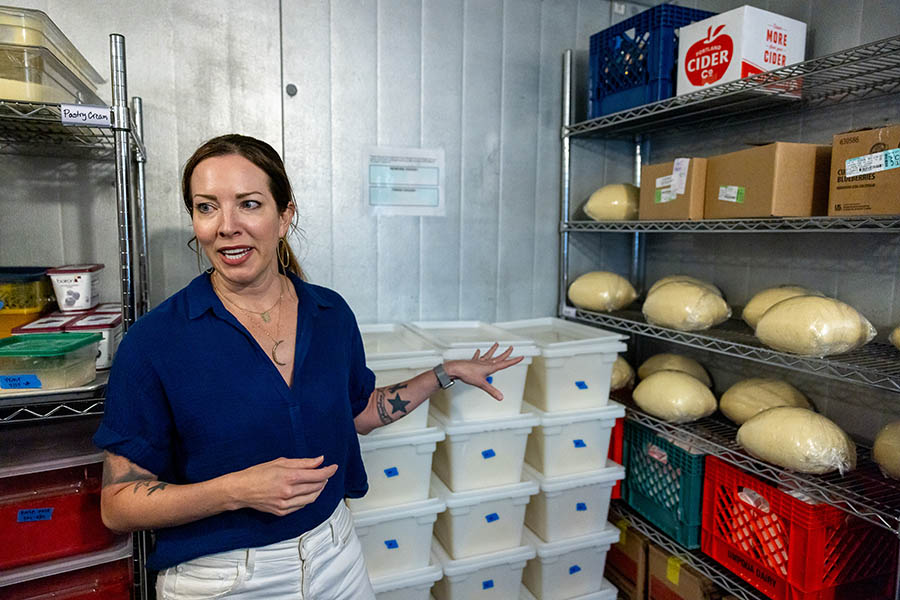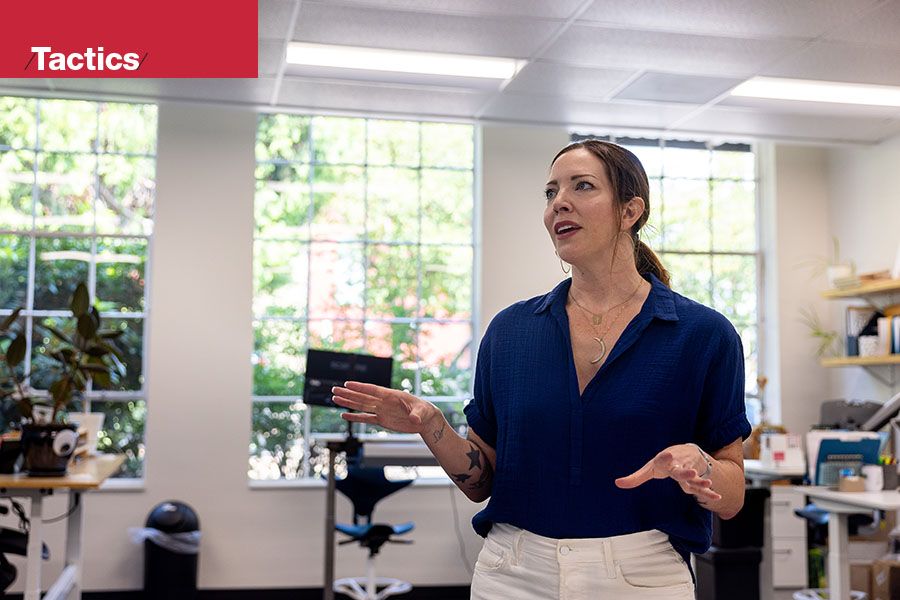Katie Poppe, CEO of Blue Star Doughnuts, talks about what inspired her to try to sell a gourmet doughnut, how the company weathered the pandemic — and what’s next.
Katie Poppe wasn’t sure Blue Star would make it.
That was true at the beginning, when she and co-founder Micah Camden hatched the idea of making gourmet doughnuts and selling them in a classed-up environment, using a brioche dough and providing an atmosphere similar to the pastry shops found in France. (Camden, who is also Poppe’s ex-husband and the co-founder of several of her prior businesses — including Little Big Burger and Boxer Ramen — is no longer involved with Blue Star.) It was such a passion project, Poppe says, that it was hard to gauge whether other people would take interest.
But they did: Almost immediately after the first Blue Star opened in 2012, customers started lining up around the block. The company grew rapidly, and at its apex, Blue Star had eight locations in Portland and three in Los Angeles.
Then on March 19, 2020, retail locations were forced to close due to gathering restrictions announced by then-Gov. Kate Brown as the first cases of COVID-19 were diagnosed in the U.S.
At first, Poppe says, “I cried my eyes out for a day,” but then, with pastry chef Stephanie Thornton, arrived at an idea that not only saved the company but shifted its model for the long haul.

Rather than operate fryers at each store, Blue Star operates a hub-and-spoke model, where doughnuts are made at the flagship location — now situated in the former Oregon Culinary Institute building in Portland’s Goose Hollow neighborhood — and delivered to its other stores.
That model lent itself well to a pandemic survival strategy that relied on delivery of a new product — doughnut bites, which come in flavors like Orange Dream and Lemon Poppyseed — to area grocery stores.
That doesn’t mean the shift was painless. Early in the pandemic, Poppe closed four stores and put most of the staff of nearly 100 people on furlough, trimming to a core team of eight; the company filed Chapter 11 bankruptcy to reorganize and pay down debt. Morrison Development, which owned Blue Star’s former flagship, later sued the company, saying it had outstanding debts, but then dropped the suit.
Now the company employs about 85 and enjoys steady business from a variety of income streams that include e-commerce and wholesale orders, as well as in-person orders at six locations in Portland and one in L.A.
This interview has been edited for space and clarity.

What did you do before doughnuts?
Well, I went to school for neurological psychology. I was on the Ph.D. track. Then in college, unfortunately, tragedy struck: My dad died in a plane crash, and a couple of weeks later, my mom died from cancer. I was 20; my brother was 16. I decided to take a gap year before continuing on to grad school and go travel around the world. It gave me a lot of time to think and to process and to not feel sorry for myself, and to really understand and appreciate what we have in our country. We still have a lot of problems and things to figure out, but I realized that I have a lot of opportunity in the States: I have access to education, to birth control; I can own property, I can get a divorce, I can have a business.
It really solidified for me that I wanted to go back and make the most out of my opportunities as a woman and to be a business owner. I didn’t know what kind of business yet. I spent about a year in an MBA program and realized, “This is more like a grooming program for Fortune 500 companies, it’s not really teaching me how to be an entrepreneur.” And around that time, I got my first business partner [Camden], who was a chef, and he had opened a couple fine-dining restaurants in Portland. This was 2008-2009. Then the economy tanked.
Not a lot of investors.
Especially not for the restaurant industry. But the foodie revolution was happening, and we noticed that even though people couldn’t afford 40 or 50 bucks a head to go to a nice restaurant, a lot of people would still come in for the burger. We thought, well, there’s something to that. I had a little bit of money left from when my parents died and decided to kind of bet the farm on the first location. Luckily, it worked. It was, I think, a combination of right time, right place; the first Little Big Burger opened in September 2010, and it was a hit — lines around the block. I made my money back in three months. And it was like, “OK, this is clearly a viable business model; can we replicate it?” We tried it with ramen, and I love that concept, but it’s very seasonal.
Blue Star was inspired by my first trip to France. I was just blown away by the quality of the pastry and the honor around it, the respect around it. You go into these pastry shops, they look like jewelry stores. They have beautiful plates, nice lighting and nice displays. In the States, we grew up with bread in a bag on the grocery shelf. It’s a very different experience. We thought, OK, well, let’s make gourmet doughnuts from scratch and use this brioche base. We have such great bounty in the Pacific Northwest with fruits and herbs, and let’s use some spices and liquors and make it a little bit more upscale, or have a doughnut for adults. Blue Star opened in December 2012. I just thought it was going to be a one-off, kind of a vanity project. And again, something about right time, right place, and the customer response just blew me away.
When you make a business, there’s the idea, the original vision of it. But really, once it’s burst into the world, the world decides what it’s going to be. It’s a dance between the vision and then the reception, and then it becomes its own thing, which I just think is so interesting. The customer response to Blue Star has really shaped it into what it’s become over the years.
So your inspiration was French pastries and the economics of the post-recession years, when people were going out but not spending a lot of money. But Portland was already on the map — we already had this kind of doughnut culture.
Hats off to Voodoo; they really were the first people to do something different, and I have a lot of respect for that. I think it started people thinking, “What else could you do differently?” For us, it was like, “What if we just try and make a very gourmet version of a doughnut?”
I love it because you see so much diversity, especially in Portland. Everybody’s doing their own thing, and I have so much respect for that. You’ve got Mikiko Mochi Donuts, you’ve got Pip’s, you’ve got Doe, who’s all vegan; everybody kind of has their own little thing going on, and it’s very diverse. I know the press likes to play up this what’s-the-best-doughnut competition, but behind the scenes, we’re all very supportive of each other. I very deliberately don’t go in their territory. They’re very good at what they’re doing. Let everybody do their own thing. Let everybody have their own space.
Can you talk about how the pandemic affected your business model?
It was so hard on the industry in general. People are not in the restaurant industry to make a lot of money. It’s very grueling, difficult, challenging work. But at the heart of it is hosting. People are called to serve, we want to make good experiences. To have all of that ripped away in the pandemic — and a lot of small-business owners didn’t have the resources and weren’t able to get lots of loans. We had the mandate to close and I just cried my eyes out the next day. A lot of really good business owners that have been in this industry for decades and had good business models and were really good at what they do — they just got obliterated, and it breaks my heart. A lot of people are just so burned out that they walked away. I get that too. I think that we’re very lucky to still be here. I don’t take that for granted at all. I’m very, very grateful to our customers and our clientele for keeping us going.

What’s the future for Blue Star?
I’m so proud of our doughnut bites. This is a new product that we just kind of invented out of desperation, and now it’s become over 30% of our revenue and has 40-state distribution. We’re so proud of the quality that we’ve been able to maintain with a large-scale production; we’re really committed to the quality and integrity of the product. And we’re also working on our next airport location; we have a spot that is under construction right now. That’ll be opening in June, 24. That will be our international showcase location. I’m just really honored and proud to be representing doughnuts in Oregon; I think we’re the only doughnut shop at Port of Portland.
Click here to subscribe to Oregon Business.






